Essay on Contemporary Philosophies of Mental Health and Illness
VerifiedAdded on 2022/09/14
|9
|2451
|14
Essay
AI Summary
This essay delves into the contemporary philosophies of mental health and mental illness, exploring the historical context of philosophical inquiry in mental health, starting with Plato. It discusses the application of philosophy in areas such as the mind-brain relationship, the classification of mental distress, and ethical considerations in psychiatry. The essay emphasizes the importance of patient narratives in improving healthcare and examines contemporary issues, including the debate over classifying mental distress as a disease, the impact of stigma, and the challenges nurses face, such as compassion fatigue. The author supports the notion that nurses must have a strong understanding of the philosophies and narratives of mental health to effectively care for patients and mitigate the negative effects of their demanding profession, using evidence from various research papers to support the arguments made throughout the essay.
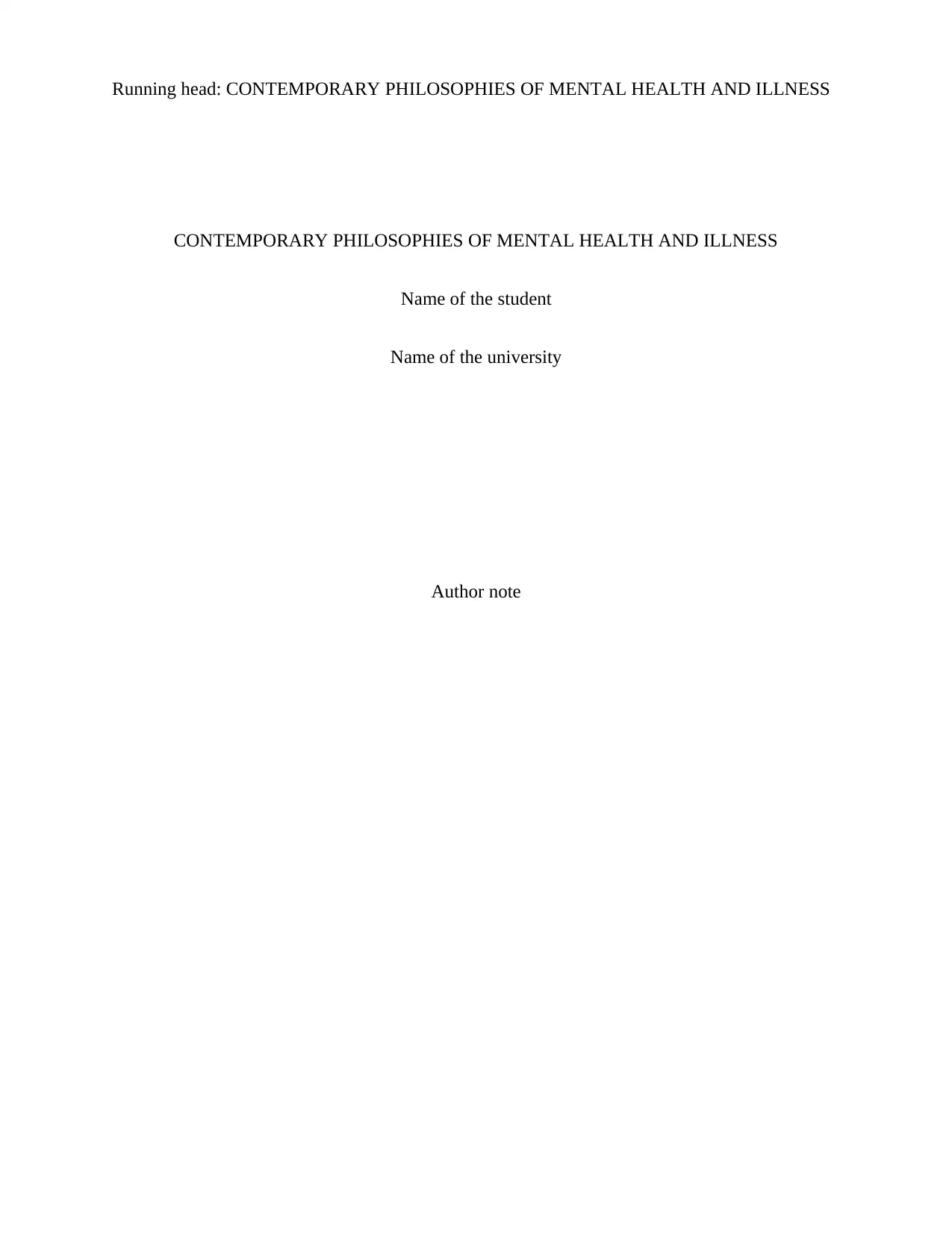
Running head: CONTEMPORARY PHILOSOPHIES OF MENTAL HEALTH AND ILLNESS
CONTEMPORARY PHILOSOPHIES OF MENTAL HEALTH AND ILLNESS
Name of the student
Name of the university
Author note
CONTEMPORARY PHILOSOPHIES OF MENTAL HEALTH AND ILLNESS
Name of the student
Name of the university
Author note
Paraphrase This Document
Need a fresh take? Get an instant paraphrase of this document with our AI Paraphraser
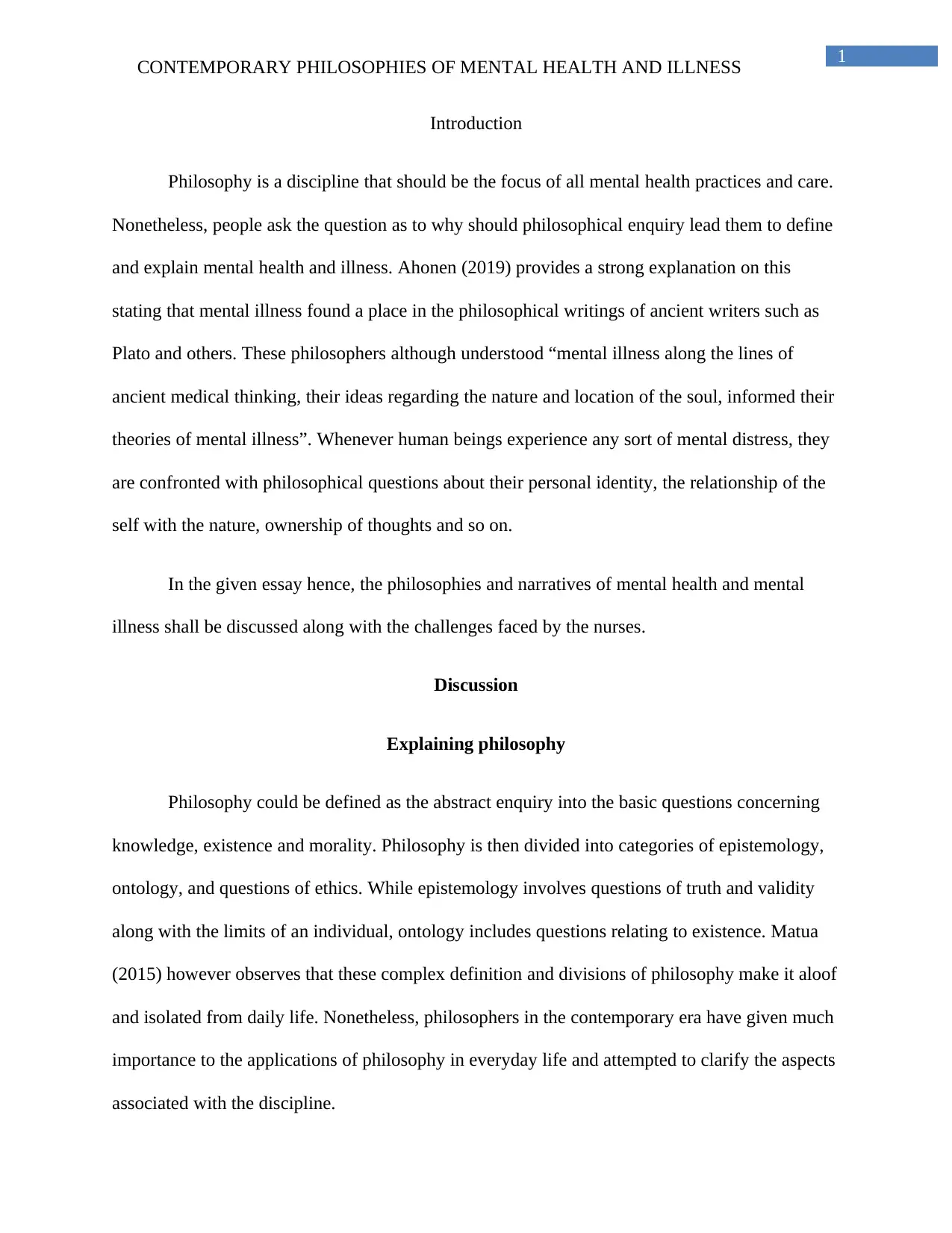
1
CONTEMPORARY PHILOSOPHIES OF MENTAL HEALTH AND ILLNESS
Introduction
Philosophy is a discipline that should be the focus of all mental health practices and care.
Nonetheless, people ask the question as to why should philosophical enquiry lead them to define
and explain mental health and illness. Ahonen (2019) provides a strong explanation on this
stating that mental illness found a place in the philosophical writings of ancient writers such as
Plato and others. These philosophers although understood “mental illness along the lines of
ancient medical thinking, their ideas regarding the nature and location of the soul, informed their
theories of mental illness”. Whenever human beings experience any sort of mental distress, they
are confronted with philosophical questions about their personal identity, the relationship of the
self with the nature, ownership of thoughts and so on.
In the given essay hence, the philosophies and narratives of mental health and mental
illness shall be discussed along with the challenges faced by the nurses.
Discussion
Explaining philosophy
Philosophy could be defined as the abstract enquiry into the basic questions concerning
knowledge, existence and morality. Philosophy is then divided into categories of epistemology,
ontology, and questions of ethics. While epistemology involves questions of truth and validity
along with the limits of an individual, ontology includes questions relating to existence. Matua
(2015) however observes that these complex definition and divisions of philosophy make it aloof
and isolated from daily life. Nonetheless, philosophers in the contemporary era have given much
importance to the applications of philosophy in everyday life and attempted to clarify the aspects
associated with the discipline.
CONTEMPORARY PHILOSOPHIES OF MENTAL HEALTH AND ILLNESS
Introduction
Philosophy is a discipline that should be the focus of all mental health practices and care.
Nonetheless, people ask the question as to why should philosophical enquiry lead them to define
and explain mental health and illness. Ahonen (2019) provides a strong explanation on this
stating that mental illness found a place in the philosophical writings of ancient writers such as
Plato and others. These philosophers although understood “mental illness along the lines of
ancient medical thinking, their ideas regarding the nature and location of the soul, informed their
theories of mental illness”. Whenever human beings experience any sort of mental distress, they
are confronted with philosophical questions about their personal identity, the relationship of the
self with the nature, ownership of thoughts and so on.
In the given essay hence, the philosophies and narratives of mental health and mental
illness shall be discussed along with the challenges faced by the nurses.
Discussion
Explaining philosophy
Philosophy could be defined as the abstract enquiry into the basic questions concerning
knowledge, existence and morality. Philosophy is then divided into categories of epistemology,
ontology, and questions of ethics. While epistemology involves questions of truth and validity
along with the limits of an individual, ontology includes questions relating to existence. Matua
(2015) however observes that these complex definition and divisions of philosophy make it aloof
and isolated from daily life. Nonetheless, philosophers in the contemporary era have given much
importance to the applications of philosophy in everyday life and attempted to clarify the aspects
associated with the discipline.
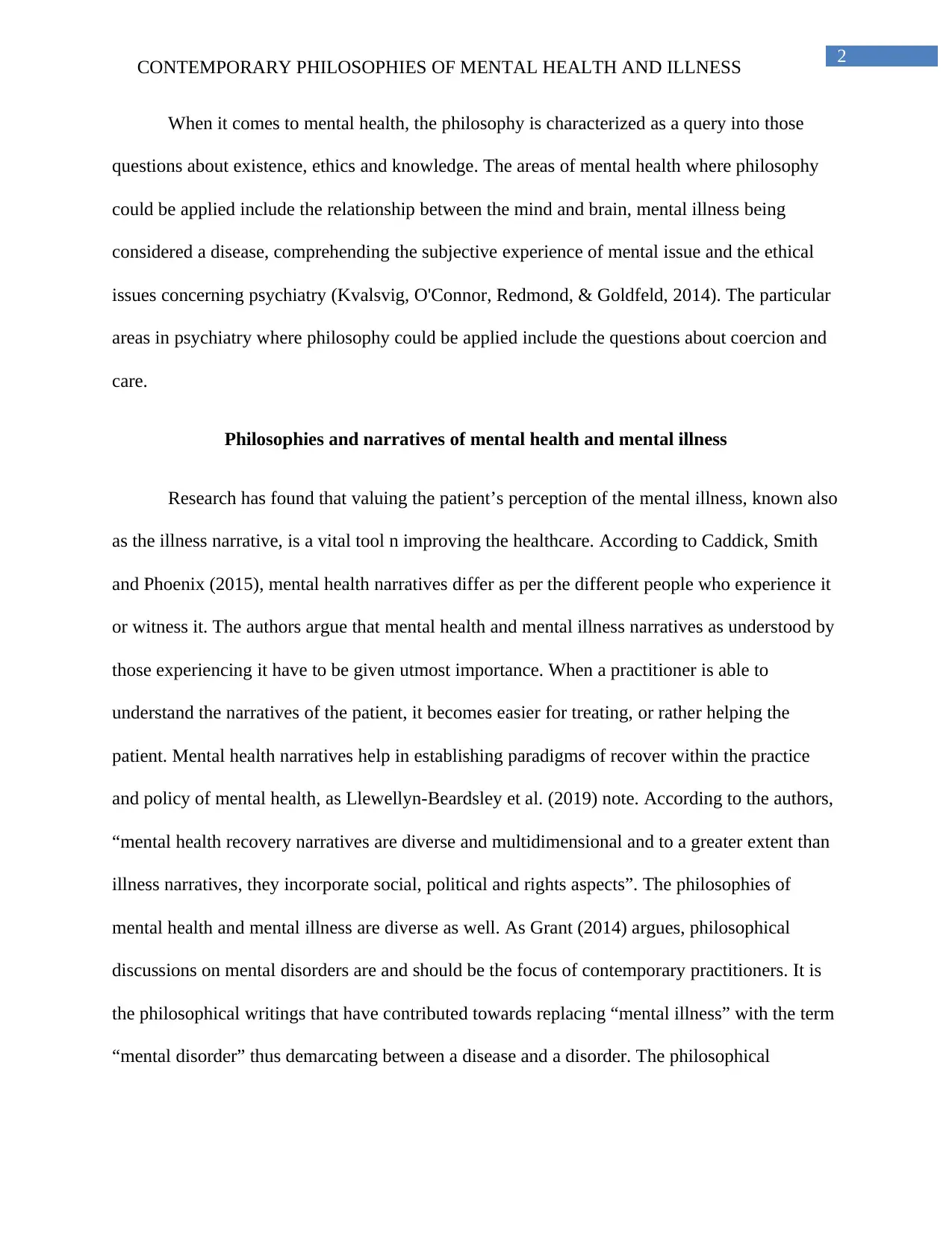
2
CONTEMPORARY PHILOSOPHIES OF MENTAL HEALTH AND ILLNESS
When it comes to mental health, the philosophy is characterized as a query into those
questions about existence, ethics and knowledge. The areas of mental health where philosophy
could be applied include the relationship between the mind and brain, mental illness being
considered a disease, comprehending the subjective experience of mental issue and the ethical
issues concerning psychiatry (Kvalsvig, O'Connor, Redmond, & Goldfeld, 2014). The particular
areas in psychiatry where philosophy could be applied include the questions about coercion and
care.
Philosophies and narratives of mental health and mental illness
Research has found that valuing the patient’s perception of the mental illness, known also
as the illness narrative, is a vital tool n improving the healthcare. According to Caddick, Smith
and Phoenix (2015), mental health narratives differ as per the different people who experience it
or witness it. The authors argue that mental health and mental illness narratives as understood by
those experiencing it have to be given utmost importance. When a practitioner is able to
understand the narratives of the patient, it becomes easier for treating, or rather helping the
patient. Mental health narratives help in establishing paradigms of recover within the practice
and policy of mental health, as Llewellyn-Beardsley et al. (2019) note. According to the authors,
“mental health recovery narratives are diverse and multidimensional and to a greater extent than
illness narratives, they incorporate social, political and rights aspects”. The philosophies of
mental health and mental illness are diverse as well. As Grant (2014) argues, philosophical
discussions on mental disorders are and should be the focus of contemporary practitioners. It is
the philosophical writings that have contributed towards replacing “mental illness” with the term
“mental disorder” thus demarcating between a disease and a disorder. The philosophical
CONTEMPORARY PHILOSOPHIES OF MENTAL HEALTH AND ILLNESS
When it comes to mental health, the philosophy is characterized as a query into those
questions about existence, ethics and knowledge. The areas of mental health where philosophy
could be applied include the relationship between the mind and brain, mental illness being
considered a disease, comprehending the subjective experience of mental issue and the ethical
issues concerning psychiatry (Kvalsvig, O'Connor, Redmond, & Goldfeld, 2014). The particular
areas in psychiatry where philosophy could be applied include the questions about coercion and
care.
Philosophies and narratives of mental health and mental illness
Research has found that valuing the patient’s perception of the mental illness, known also
as the illness narrative, is a vital tool n improving the healthcare. According to Caddick, Smith
and Phoenix (2015), mental health narratives differ as per the different people who experience it
or witness it. The authors argue that mental health and mental illness narratives as understood by
those experiencing it have to be given utmost importance. When a practitioner is able to
understand the narratives of the patient, it becomes easier for treating, or rather helping the
patient. Mental health narratives help in establishing paradigms of recover within the practice
and policy of mental health, as Llewellyn-Beardsley et al. (2019) note. According to the authors,
“mental health recovery narratives are diverse and multidimensional and to a greater extent than
illness narratives, they incorporate social, political and rights aspects”. The philosophies of
mental health and mental illness are diverse as well. As Grant (2014) argues, philosophical
discussions on mental disorders are and should be the focus of contemporary practitioners. It is
the philosophical writings that have contributed towards replacing “mental illness” with the term
“mental disorder” thus demarcating between a disease and a disorder. The philosophical
⊘ This is a preview!⊘
Do you want full access?
Subscribe today to unlock all pages.

Trusted by 1+ million students worldwide
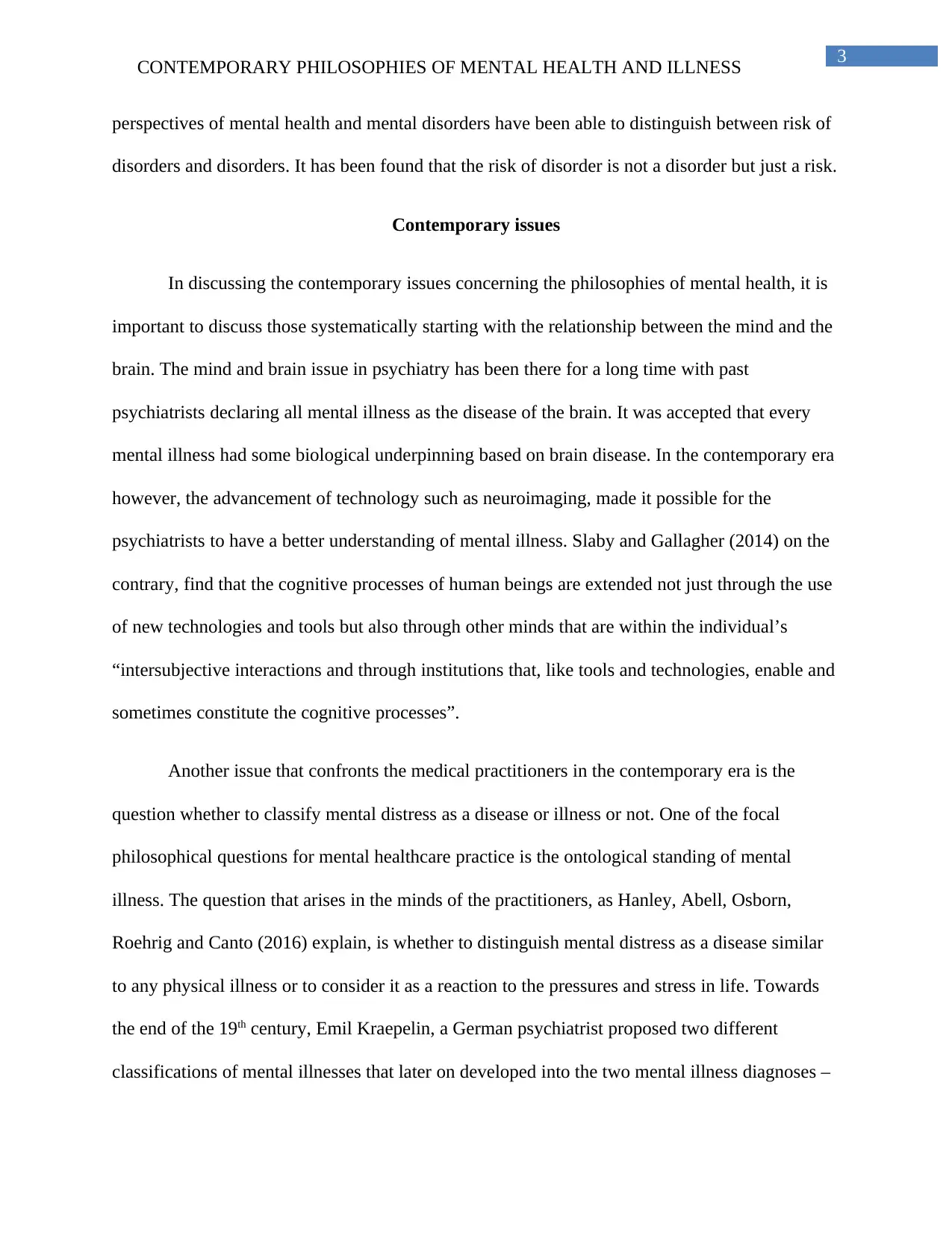
3
CONTEMPORARY PHILOSOPHIES OF MENTAL HEALTH AND ILLNESS
perspectives of mental health and mental disorders have been able to distinguish between risk of
disorders and disorders. It has been found that the risk of disorder is not a disorder but just a risk.
Contemporary issues
In discussing the contemporary issues concerning the philosophies of mental health, it is
important to discuss those systematically starting with the relationship between the mind and the
brain. The mind and brain issue in psychiatry has been there for a long time with past
psychiatrists declaring all mental illness as the disease of the brain. It was accepted that every
mental illness had some biological underpinning based on brain disease. In the contemporary era
however, the advancement of technology such as neuroimaging, made it possible for the
psychiatrists to have a better understanding of mental illness. Slaby and Gallagher (2014) on the
contrary, find that the cognitive processes of human beings are extended not just through the use
of new technologies and tools but also through other minds that are within the individual’s
“intersubjective interactions and through institutions that, like tools and technologies, enable and
sometimes constitute the cognitive processes”.
Another issue that confronts the medical practitioners in the contemporary era is the
question whether to classify mental distress as a disease or illness or not. One of the focal
philosophical questions for mental healthcare practice is the ontological standing of mental
illness. The question that arises in the minds of the practitioners, as Hanley, Abell, Osborn,
Roehrig and Canto (2016) explain, is whether to distinguish mental distress as a disease similar
to any physical illness or to consider it as a reaction to the pressures and stress in life. Towards
the end of the 19th century, Emil Kraepelin, a German psychiatrist proposed two different
classifications of mental illnesses that later on developed into the two mental illness diagnoses –
CONTEMPORARY PHILOSOPHIES OF MENTAL HEALTH AND ILLNESS
perspectives of mental health and mental disorders have been able to distinguish between risk of
disorders and disorders. It has been found that the risk of disorder is not a disorder but just a risk.
Contemporary issues
In discussing the contemporary issues concerning the philosophies of mental health, it is
important to discuss those systematically starting with the relationship between the mind and the
brain. The mind and brain issue in psychiatry has been there for a long time with past
psychiatrists declaring all mental illness as the disease of the brain. It was accepted that every
mental illness had some biological underpinning based on brain disease. In the contemporary era
however, the advancement of technology such as neuroimaging, made it possible for the
psychiatrists to have a better understanding of mental illness. Slaby and Gallagher (2014) on the
contrary, find that the cognitive processes of human beings are extended not just through the use
of new technologies and tools but also through other minds that are within the individual’s
“intersubjective interactions and through institutions that, like tools and technologies, enable and
sometimes constitute the cognitive processes”.
Another issue that confronts the medical practitioners in the contemporary era is the
question whether to classify mental distress as a disease or illness or not. One of the focal
philosophical questions for mental healthcare practice is the ontological standing of mental
illness. The question that arises in the minds of the practitioners, as Hanley, Abell, Osborn,
Roehrig and Canto (2016) explain, is whether to distinguish mental distress as a disease similar
to any physical illness or to consider it as a reaction to the pressures and stress in life. Towards
the end of the 19th century, Emil Kraepelin, a German psychiatrist proposed two different
classifications of mental illnesses that later on developed into the two mental illness diagnoses –
Paraphrase This Document
Need a fresh take? Get an instant paraphrase of this document with our AI Paraphraser
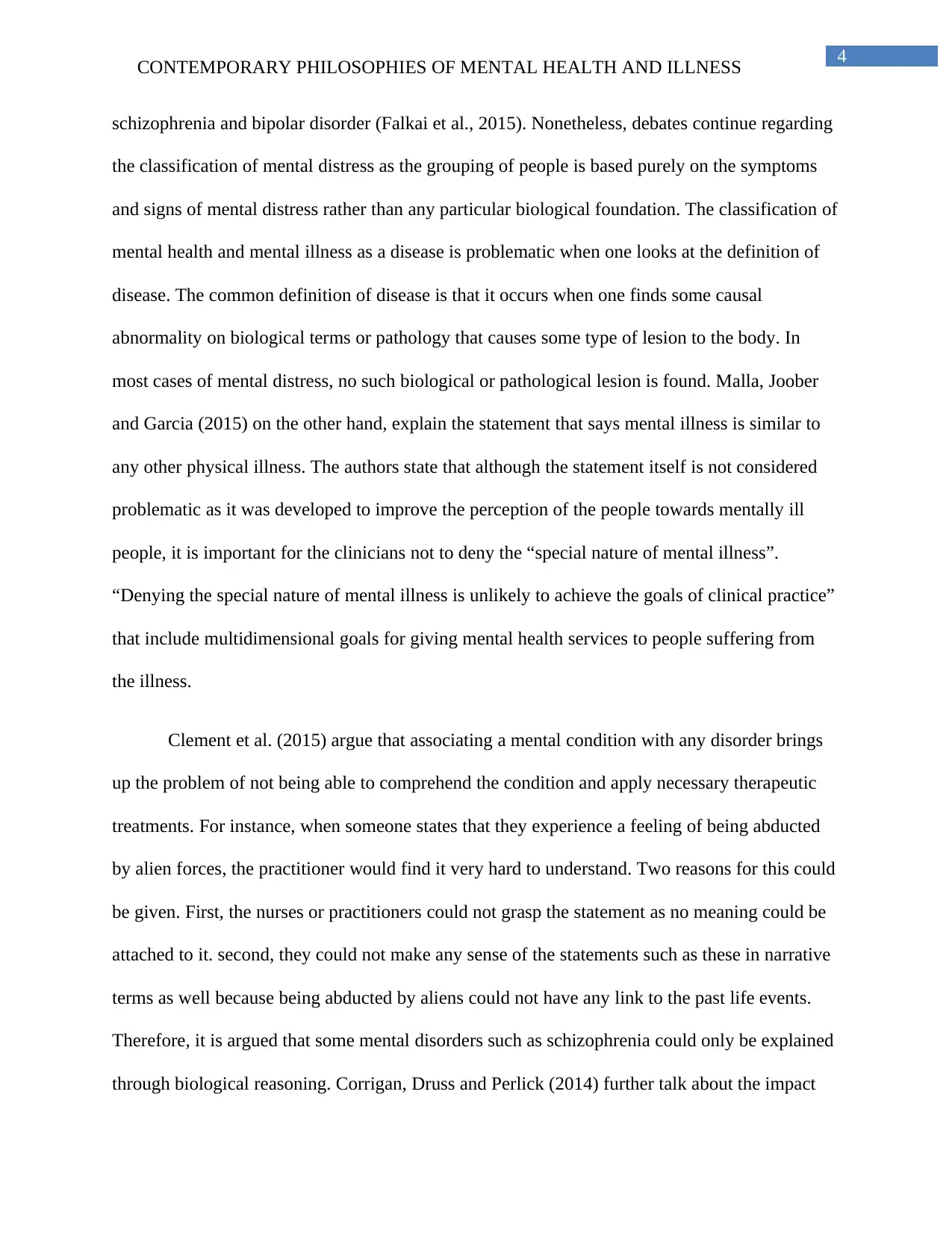
4
CONTEMPORARY PHILOSOPHIES OF MENTAL HEALTH AND ILLNESS
schizophrenia and bipolar disorder (Falkai et al., 2015). Nonetheless, debates continue regarding
the classification of mental distress as the grouping of people is based purely on the symptoms
and signs of mental distress rather than any particular biological foundation. The classification of
mental health and mental illness as a disease is problematic when one looks at the definition of
disease. The common definition of disease is that it occurs when one finds some causal
abnormality on biological terms or pathology that causes some type of lesion to the body. In
most cases of mental distress, no such biological or pathological lesion is found. Malla, Joober
and Garcia (2015) on the other hand, explain the statement that says mental illness is similar to
any other physical illness. The authors state that although the statement itself is not considered
problematic as it was developed to improve the perception of the people towards mentally ill
people, it is important for the clinicians not to deny the “special nature of mental illness”.
“Denying the special nature of mental illness is unlikely to achieve the goals of clinical practice”
that include multidimensional goals for giving mental health services to people suffering from
the illness.
Clement et al. (2015) argue that associating a mental condition with any disorder brings
up the problem of not being able to comprehend the condition and apply necessary therapeutic
treatments. For instance, when someone states that they experience a feeling of being abducted
by alien forces, the practitioner would find it very hard to understand. Two reasons for this could
be given. First, the nurses or practitioners could not grasp the statement as no meaning could be
attached to it. second, they could not make any sense of the statements such as these in narrative
terms as well because being abducted by aliens could not have any link to the past life events.
Therefore, it is argued that some mental disorders such as schizophrenia could only be explained
through biological reasoning. Corrigan, Druss and Perlick (2014) further talk about the impact
CONTEMPORARY PHILOSOPHIES OF MENTAL HEALTH AND ILLNESS
schizophrenia and bipolar disorder (Falkai et al., 2015). Nonetheless, debates continue regarding
the classification of mental distress as the grouping of people is based purely on the symptoms
and signs of mental distress rather than any particular biological foundation. The classification of
mental health and mental illness as a disease is problematic when one looks at the definition of
disease. The common definition of disease is that it occurs when one finds some causal
abnormality on biological terms or pathology that causes some type of lesion to the body. In
most cases of mental distress, no such biological or pathological lesion is found. Malla, Joober
and Garcia (2015) on the other hand, explain the statement that says mental illness is similar to
any other physical illness. The authors state that although the statement itself is not considered
problematic as it was developed to improve the perception of the people towards mentally ill
people, it is important for the clinicians not to deny the “special nature of mental illness”.
“Denying the special nature of mental illness is unlikely to achieve the goals of clinical practice”
that include multidimensional goals for giving mental health services to people suffering from
the illness.
Clement et al. (2015) argue that associating a mental condition with any disorder brings
up the problem of not being able to comprehend the condition and apply necessary therapeutic
treatments. For instance, when someone states that they experience a feeling of being abducted
by alien forces, the practitioner would find it very hard to understand. Two reasons for this could
be given. First, the nurses or practitioners could not grasp the statement as no meaning could be
attached to it. second, they could not make any sense of the statements such as these in narrative
terms as well because being abducted by aliens could not have any link to the past life events.
Therefore, it is argued that some mental disorders such as schizophrenia could only be explained
through biological reasoning. Corrigan, Druss and Perlick (2014) further talk about the impact
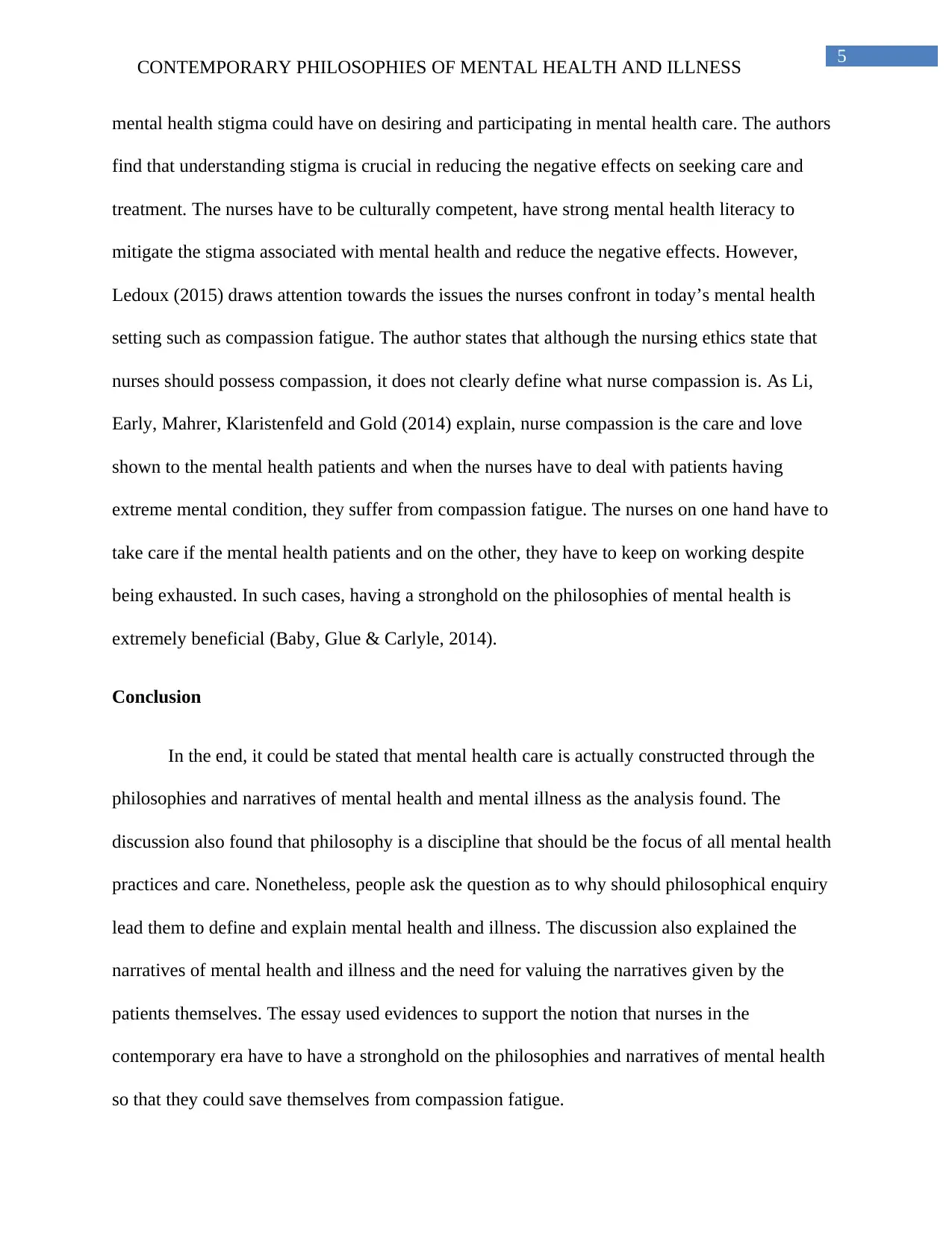
5
CONTEMPORARY PHILOSOPHIES OF MENTAL HEALTH AND ILLNESS
mental health stigma could have on desiring and participating in mental health care. The authors
find that understanding stigma is crucial in reducing the negative effects on seeking care and
treatment. The nurses have to be culturally competent, have strong mental health literacy to
mitigate the stigma associated with mental health and reduce the negative effects. However,
Ledoux (2015) draws attention towards the issues the nurses confront in today’s mental health
setting such as compassion fatigue. The author states that although the nursing ethics state that
nurses should possess compassion, it does not clearly define what nurse compassion is. As Li,
Early, Mahrer, Klaristenfeld and Gold (2014) explain, nurse compassion is the care and love
shown to the mental health patients and when the nurses have to deal with patients having
extreme mental condition, they suffer from compassion fatigue. The nurses on one hand have to
take care if the mental health patients and on the other, they have to keep on working despite
being exhausted. In such cases, having a stronghold on the philosophies of mental health is
extremely beneficial (Baby, Glue & Carlyle, 2014).
Conclusion
In the end, it could be stated that mental health care is actually constructed through the
philosophies and narratives of mental health and mental illness as the analysis found. The
discussion also found that philosophy is a discipline that should be the focus of all mental health
practices and care. Nonetheless, people ask the question as to why should philosophical enquiry
lead them to define and explain mental health and illness. The discussion also explained the
narratives of mental health and illness and the need for valuing the narratives given by the
patients themselves. The essay used evidences to support the notion that nurses in the
contemporary era have to have a stronghold on the philosophies and narratives of mental health
so that they could save themselves from compassion fatigue.
CONTEMPORARY PHILOSOPHIES OF MENTAL HEALTH AND ILLNESS
mental health stigma could have on desiring and participating in mental health care. The authors
find that understanding stigma is crucial in reducing the negative effects on seeking care and
treatment. The nurses have to be culturally competent, have strong mental health literacy to
mitigate the stigma associated with mental health and reduce the negative effects. However,
Ledoux (2015) draws attention towards the issues the nurses confront in today’s mental health
setting such as compassion fatigue. The author states that although the nursing ethics state that
nurses should possess compassion, it does not clearly define what nurse compassion is. As Li,
Early, Mahrer, Klaristenfeld and Gold (2014) explain, nurse compassion is the care and love
shown to the mental health patients and when the nurses have to deal with patients having
extreme mental condition, they suffer from compassion fatigue. The nurses on one hand have to
take care if the mental health patients and on the other, they have to keep on working despite
being exhausted. In such cases, having a stronghold on the philosophies of mental health is
extremely beneficial (Baby, Glue & Carlyle, 2014).
Conclusion
In the end, it could be stated that mental health care is actually constructed through the
philosophies and narratives of mental health and mental illness as the analysis found. The
discussion also found that philosophy is a discipline that should be the focus of all mental health
practices and care. Nonetheless, people ask the question as to why should philosophical enquiry
lead them to define and explain mental health and illness. The discussion also explained the
narratives of mental health and illness and the need for valuing the narratives given by the
patients themselves. The essay used evidences to support the notion that nurses in the
contemporary era have to have a stronghold on the philosophies and narratives of mental health
so that they could save themselves from compassion fatigue.
⊘ This is a preview!⊘
Do you want full access?
Subscribe today to unlock all pages.

Trusted by 1+ million students worldwide
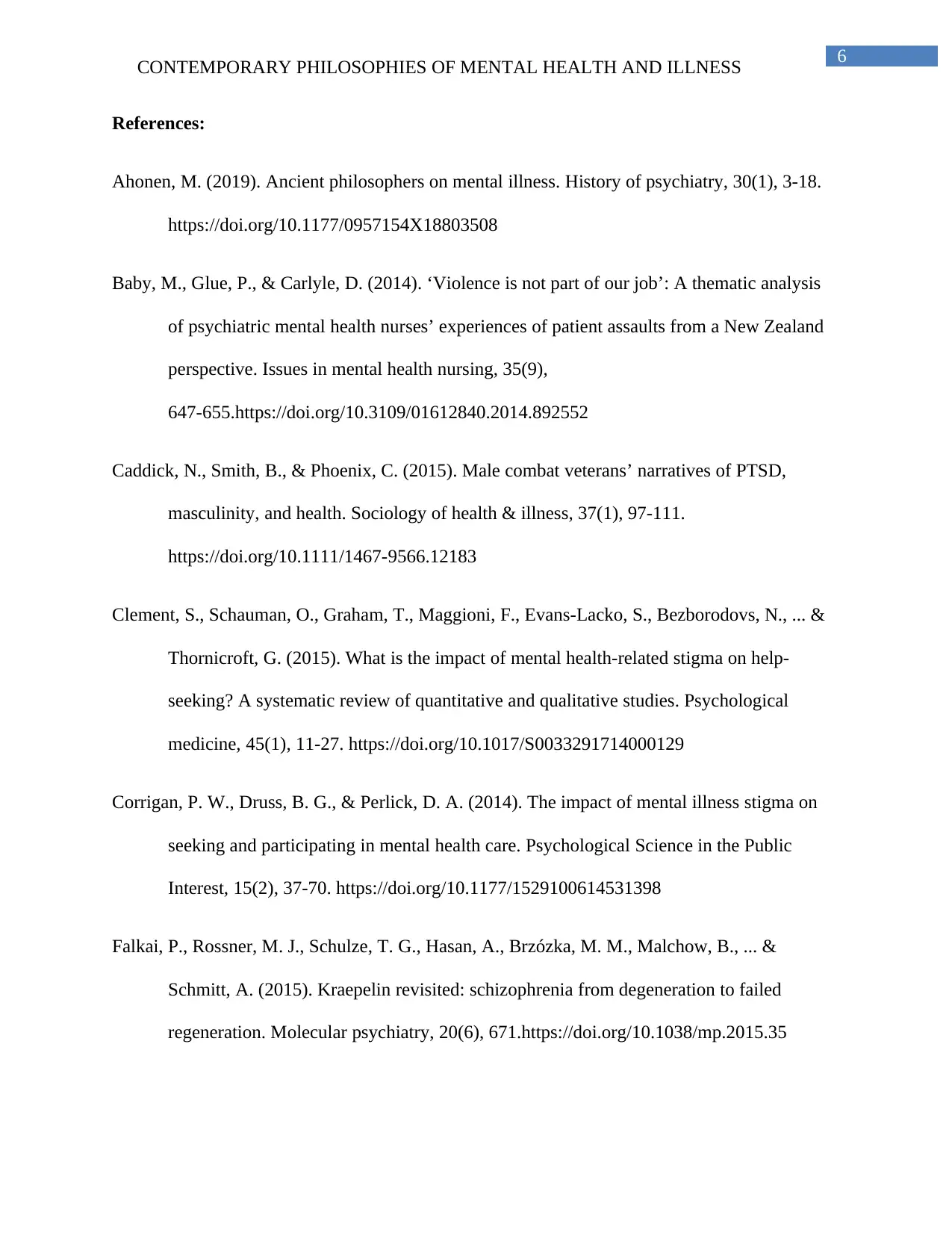
6
CONTEMPORARY PHILOSOPHIES OF MENTAL HEALTH AND ILLNESS
References:
Ahonen, M. (2019). Ancient philosophers on mental illness. History of psychiatry, 30(1), 3-18.
https://doi.org/10.1177/0957154X18803508
Baby, M., Glue, P., & Carlyle, D. (2014). ‘Violence is not part of our job’: A thematic analysis
of psychiatric mental health nurses’ experiences of patient assaults from a New Zealand
perspective. Issues in mental health nursing, 35(9),
647-655.https://doi.org/10.3109/01612840.2014.892552
Caddick, N., Smith, B., & Phoenix, C. (2015). Male combat veterans’ narratives of PTSD,
masculinity, and health. Sociology of health & illness, 37(1), 97-111.
https://doi.org/10.1111/1467-9566.12183
Clement, S., Schauman, O., Graham, T., Maggioni, F., Evans-Lacko, S., Bezborodovs, N., ... &
Thornicroft, G. (2015). What is the impact of mental health-related stigma on help-
seeking? A systematic review of quantitative and qualitative studies. Psychological
medicine, 45(1), 11-27. https://doi.org/10.1017/S0033291714000129
Corrigan, P. W., Druss, B. G., & Perlick, D. A. (2014). The impact of mental illness stigma on
seeking and participating in mental health care. Psychological Science in the Public
Interest, 15(2), 37-70. https://doi.org/10.1177/1529100614531398
Falkai, P., Rossner, M. J., Schulze, T. G., Hasan, A., Brzózka, M. M., Malchow, B., ... &
Schmitt, A. (2015). Kraepelin revisited: schizophrenia from degeneration to failed
regeneration. Molecular psychiatry, 20(6), 671.https://doi.org/10.1038/mp.2015.35
CONTEMPORARY PHILOSOPHIES OF MENTAL HEALTH AND ILLNESS
References:
Ahonen, M. (2019). Ancient philosophers on mental illness. History of psychiatry, 30(1), 3-18.
https://doi.org/10.1177/0957154X18803508
Baby, M., Glue, P., & Carlyle, D. (2014). ‘Violence is not part of our job’: A thematic analysis
of psychiatric mental health nurses’ experiences of patient assaults from a New Zealand
perspective. Issues in mental health nursing, 35(9),
647-655.https://doi.org/10.3109/01612840.2014.892552
Caddick, N., Smith, B., & Phoenix, C. (2015). Male combat veterans’ narratives of PTSD,
masculinity, and health. Sociology of health & illness, 37(1), 97-111.
https://doi.org/10.1111/1467-9566.12183
Clement, S., Schauman, O., Graham, T., Maggioni, F., Evans-Lacko, S., Bezborodovs, N., ... &
Thornicroft, G. (2015). What is the impact of mental health-related stigma on help-
seeking? A systematic review of quantitative and qualitative studies. Psychological
medicine, 45(1), 11-27. https://doi.org/10.1017/S0033291714000129
Corrigan, P. W., Druss, B. G., & Perlick, D. A. (2014). The impact of mental illness stigma on
seeking and participating in mental health care. Psychological Science in the Public
Interest, 15(2), 37-70. https://doi.org/10.1177/1529100614531398
Falkai, P., Rossner, M. J., Schulze, T. G., Hasan, A., Brzózka, M. M., Malchow, B., ... &
Schmitt, A. (2015). Kraepelin revisited: schizophrenia from degeneration to failed
regeneration. Molecular psychiatry, 20(6), 671.https://doi.org/10.1038/mp.2015.35
Paraphrase This Document
Need a fresh take? Get an instant paraphrase of this document with our AI Paraphraser
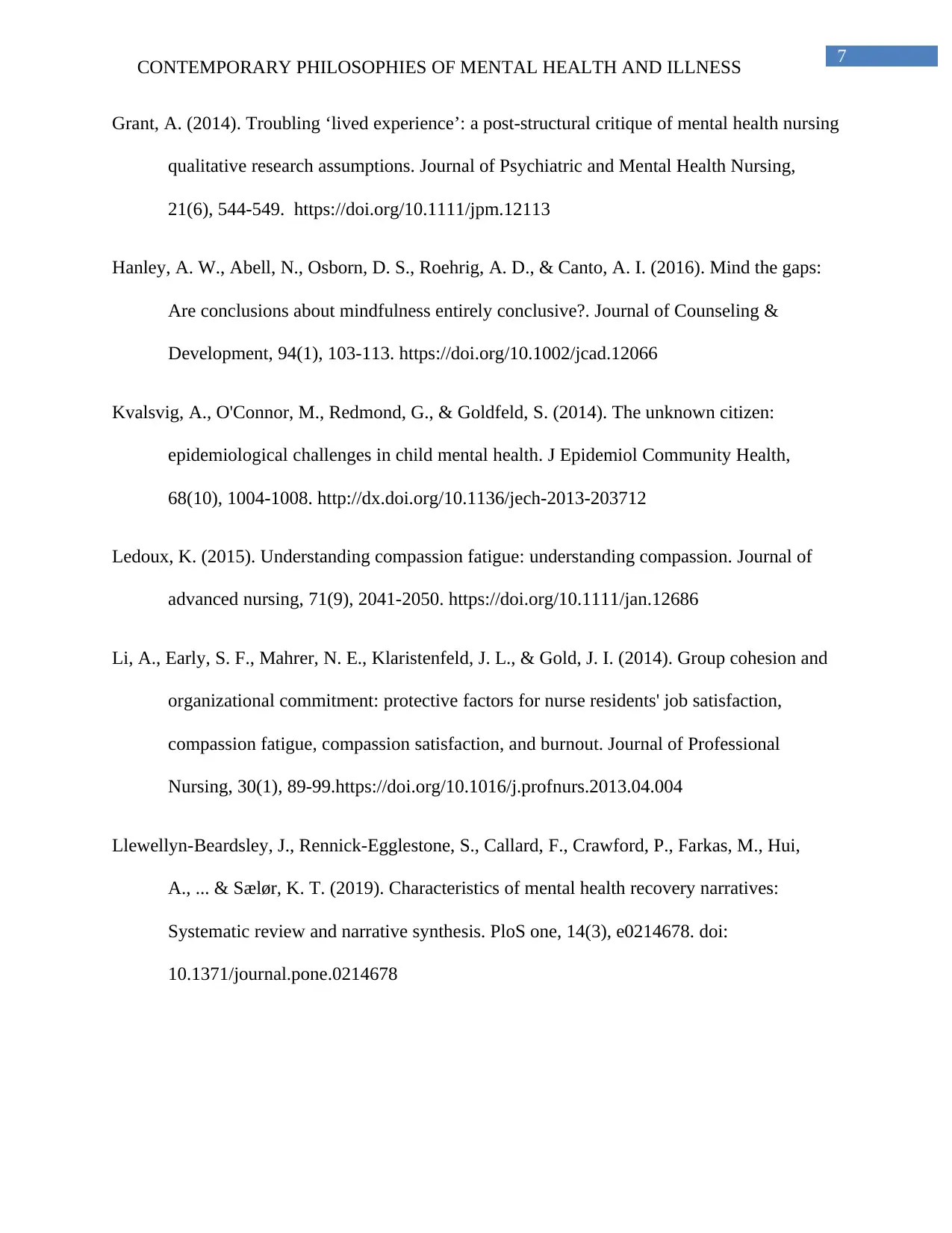
7
CONTEMPORARY PHILOSOPHIES OF MENTAL HEALTH AND ILLNESS
Grant, A. (2014). Troubling ‘lived experience’: a post‐structural critique of mental health nursing
qualitative research assumptions. Journal of Psychiatric and Mental Health Nursing,
21(6), 544-549. https://doi.org/10.1111/jpm.12113
Hanley, A. W., Abell, N., Osborn, D. S., Roehrig, A. D., & Canto, A. I. (2016). Mind the gaps:
Are conclusions about mindfulness entirely conclusive?. Journal of Counseling &
Development, 94(1), 103-113. https://doi.org/10.1002/jcad.12066
Kvalsvig, A., O'Connor, M., Redmond, G., & Goldfeld, S. (2014). The unknown citizen:
epidemiological challenges in child mental health. J Epidemiol Community Health,
68(10), 1004-1008. http://dx.doi.org/10.1136/jech-2013-203712
Ledoux, K. (2015). Understanding compassion fatigue: understanding compassion. Journal of
advanced nursing, 71(9), 2041-2050. https://doi.org/10.1111/jan.12686
Li, A., Early, S. F., Mahrer, N. E., Klaristenfeld, J. L., & Gold, J. I. (2014). Group cohesion and
organizational commitment: protective factors for nurse residents' job satisfaction,
compassion fatigue, compassion satisfaction, and burnout. Journal of Professional
Nursing, 30(1), 89-99.https://doi.org/10.1016/j.profnurs.2013.04.004
Llewellyn-Beardsley, J., Rennick-Egglestone, S., Callard, F., Crawford, P., Farkas, M., Hui,
A., ... & Sælør, K. T. (2019). Characteristics of mental health recovery narratives:
Systematic review and narrative synthesis. PloS one, 14(3), e0214678. doi:
10.1371/journal.pone.0214678
CONTEMPORARY PHILOSOPHIES OF MENTAL HEALTH AND ILLNESS
Grant, A. (2014). Troubling ‘lived experience’: a post‐structural critique of mental health nursing
qualitative research assumptions. Journal of Psychiatric and Mental Health Nursing,
21(6), 544-549. https://doi.org/10.1111/jpm.12113
Hanley, A. W., Abell, N., Osborn, D. S., Roehrig, A. D., & Canto, A. I. (2016). Mind the gaps:
Are conclusions about mindfulness entirely conclusive?. Journal of Counseling &
Development, 94(1), 103-113. https://doi.org/10.1002/jcad.12066
Kvalsvig, A., O'Connor, M., Redmond, G., & Goldfeld, S. (2014). The unknown citizen:
epidemiological challenges in child mental health. J Epidemiol Community Health,
68(10), 1004-1008. http://dx.doi.org/10.1136/jech-2013-203712
Ledoux, K. (2015). Understanding compassion fatigue: understanding compassion. Journal of
advanced nursing, 71(9), 2041-2050. https://doi.org/10.1111/jan.12686
Li, A., Early, S. F., Mahrer, N. E., Klaristenfeld, J. L., & Gold, J. I. (2014). Group cohesion and
organizational commitment: protective factors for nurse residents' job satisfaction,
compassion fatigue, compassion satisfaction, and burnout. Journal of Professional
Nursing, 30(1), 89-99.https://doi.org/10.1016/j.profnurs.2013.04.004
Llewellyn-Beardsley, J., Rennick-Egglestone, S., Callard, F., Crawford, P., Farkas, M., Hui,
A., ... & Sælør, K. T. (2019). Characteristics of mental health recovery narratives:
Systematic review and narrative synthesis. PloS one, 14(3), e0214678. doi:
10.1371/journal.pone.0214678
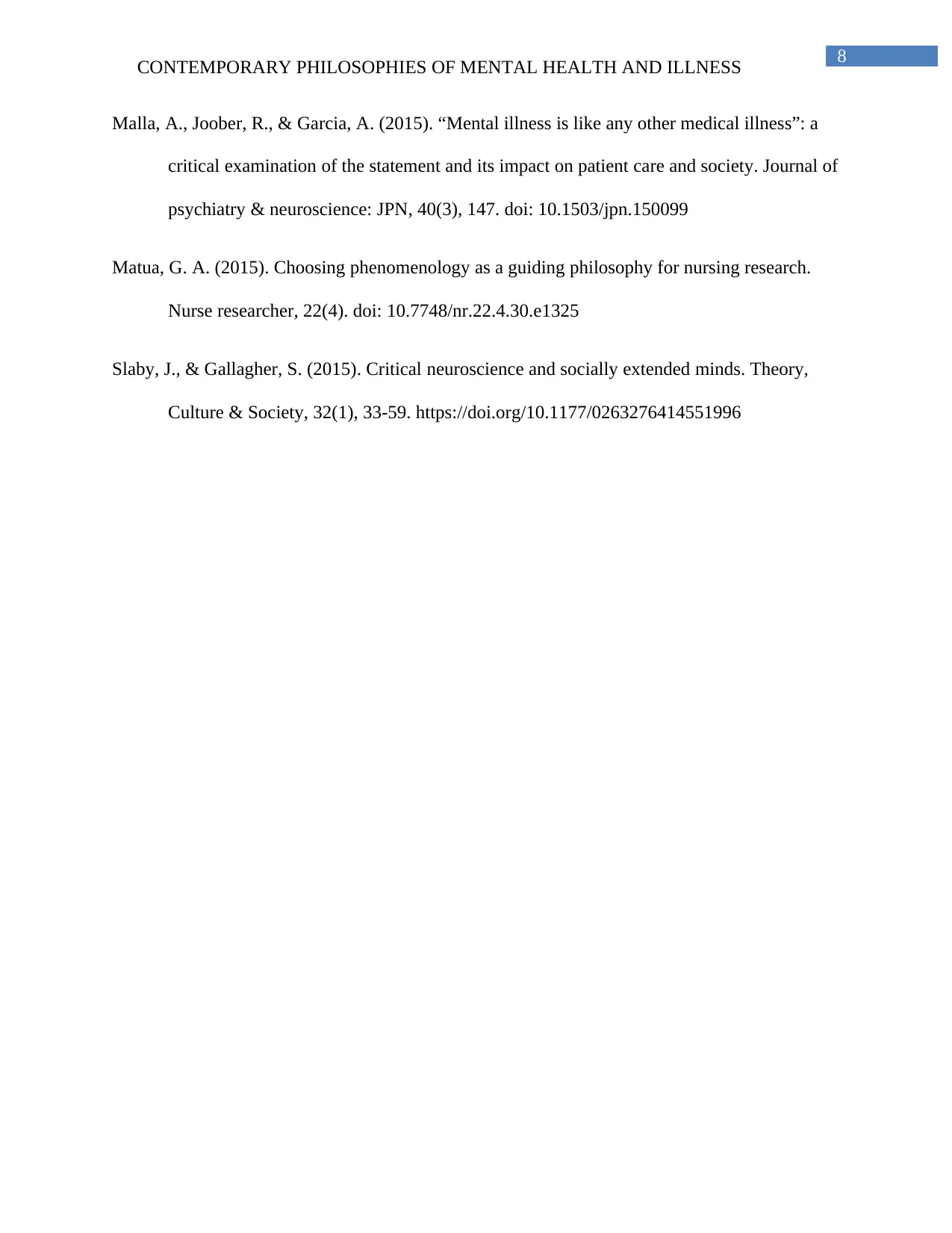
8
CONTEMPORARY PHILOSOPHIES OF MENTAL HEALTH AND ILLNESS
Malla, A., Joober, R., & Garcia, A. (2015). “Mental illness is like any other medical illness”: a
critical examination of the statement and its impact on patient care and society. Journal of
psychiatry & neuroscience: JPN, 40(3), 147. doi: 10.1503/jpn.150099
Matua, G. A. (2015). Choosing phenomenology as a guiding philosophy for nursing research.
Nurse researcher, 22(4). doi: 10.7748/nr.22.4.30.e1325
Slaby, J., & Gallagher, S. (2015). Critical neuroscience and socially extended minds. Theory,
Culture & Society, 32(1), 33-59. https://doi.org/10.1177/0263276414551996
CONTEMPORARY PHILOSOPHIES OF MENTAL HEALTH AND ILLNESS
Malla, A., Joober, R., & Garcia, A. (2015). “Mental illness is like any other medical illness”: a
critical examination of the statement and its impact on patient care and society. Journal of
psychiatry & neuroscience: JPN, 40(3), 147. doi: 10.1503/jpn.150099
Matua, G. A. (2015). Choosing phenomenology as a guiding philosophy for nursing research.
Nurse researcher, 22(4). doi: 10.7748/nr.22.4.30.e1325
Slaby, J., & Gallagher, S. (2015). Critical neuroscience and socially extended minds. Theory,
Culture & Society, 32(1), 33-59. https://doi.org/10.1177/0263276414551996
⊘ This is a preview!⊘
Do you want full access?
Subscribe today to unlock all pages.

Trusted by 1+ million students worldwide
1 out of 9
Your All-in-One AI-Powered Toolkit for Academic Success.
+13062052269
info@desklib.com
Available 24*7 on WhatsApp / Email
![[object Object]](/_next/static/media/star-bottom.7253800d.svg)
Unlock your academic potential
Copyright © 2020–2026 A2Z Services. All Rights Reserved. Developed and managed by ZUCOL.


